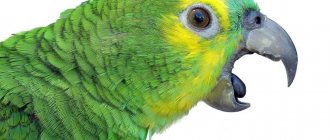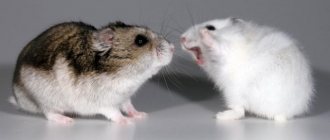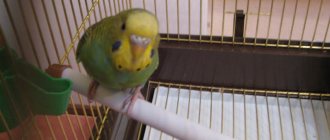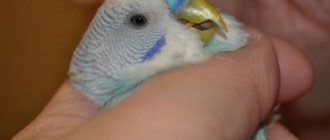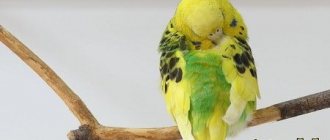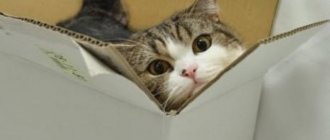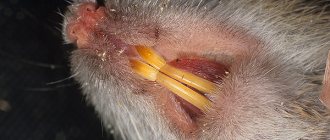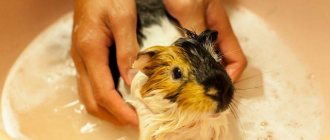A healthy bird has a perky disposition, sparkles of joy appear in its eyes, and its movements are light and playful. The appearance of tremors in the body causes illness, improper feeding, exhaustion, and weakening. Often the situation can be resolved on your own. If the pet does not respond to contact, does not go for a walk, but sits in one place with its wings ruffled, it needs specialized treatment from a veterinarian and special care.
Main reasons
The causes of bird's yeast can be:
- Avitaminosis.
- Strong fear.
- Tracheal mite.
- Someone else's apartment or new environment.
- Large grains stuck in the crop.
- The parrot is frozen.
- Inflammatory processes.
Stress
Fear, which appears due to various circumstances, causes stiffness in movements, the bird freezes and cannot fly freely.
Often the appearance of anxiety is provoked by: the ringing laughter of approaching children, barking dogs, the sound of restless noise will greatly frighten the bird, the consequences are fraught with cardiac arrest.
In such cases, it is necessary to caress the parrot, it is necessary to eliminate threatening factors, to calm the bird:
- Remove animals.
- Take the children out of the room.
- Turn off the equipment.
- Close the door.
If the pet constantly sleeps, it does not mean that the parrot is sick; nervous shocks and worries may occur.
Hypothermia
The bird's thin cover of feathers is designed to exist in a warm temperate climate, so the pet may not be able to withstand drafts. If a parrot sits on a perch like a mouse and the feather cover is noticeably inflated, the parrot is trembling - this indicates the launch of thermoregulation processes in the body.
If the reason for the bird's trembling is cold, it is necessary to eliminate the draft (close the window, doors), place the parrot near a radiator or heater and no longer allow the bird to become hypothermic, move the cage to the upper part of the room or cover the cage with a thick cloth, leaving one side half-open. Place a bottle of hot water in the cage; the steam will create heat. If your pet is constantly shivering, this means severe hypothermia.
Avitaminosis
The lack of microelements and vitamins for normal body function begins with a disruption of the nervous system. Imbalance occurs due to insufficient supply of nutrients to the body. With poor nutrition, immunity and appetite decrease, and organs become vulnerable to the development of various diseases. The bird's tail, wings, and limbs are trembling from exhaustion and weakness. A parrot (be it a budgerigar or a cockatiel) needs a balanced diet and rest, otherwise the pet will tremble for a long time.
To provide assistance, you will need to add fortified components that are found in berries and fruits to the diet; it may be necessary to switch your pet to another food rich in vitamins and minerals. Do not feed nuts, papaya or persimmons. Herbs rich in microelements include: shepherd's purse, sorrel, wheatgrass and dandelions; Finely chop the plants and place them in the feeder. The cockatiel must live outside of the cage to fully expand its wings.
The pet will not tremble after consuming fortified food.
Disease
Constant and periodic trembling sometimes becomes the cause of the onset of illness: infectious, parasitic in nature, intoxication, digestive disorders. In this case, symptoms are added: the eyes are closed for a long time, breathing is difficult, the individual is inactive, sits in one place, and does not fly.
To carry out a diagnosis, you must contact a veterinary clinic, where the appropriate medications will be prescribed. If your budgie or cockatiel is breathing heavily, you need to find out the cause and fix it. To establish a diagnosis, it is better not to self-medicate but to take the bird to a veterinarian or ornithologist.
The cause of trembling may be a symptom of inflammation in the body, in which case the bird must be prescribed antibiotics.
Diseases
All of the above reasons reduce immunity and can provoke various diseases. If you do not pay attention to the symptoms, the parrot's condition will worsen, which can lead to complications and even death.
Symptoms:
- vomit;
- constipation;
- diarrhea;
- drowsiness;
- sloppy appearance;
- discharge;
- the bird wheezes and groans.
The reason that the parrot is trembling may be poisoning, an allergic reaction, a fungal infection, a viral infection, or diseases of the internal organs.
You should not self-medicate. If trembling is accompanied by various symptoms, you should immediately consult a specialist. He will help identify the disease and prescribe treatment.
Why is he shaking his head?
Your pet may shake their head for many reasons:
- Looking for someone.
- Be sick.
- Particles of grains remained in the crop.
- Presence of a tracheal mite.
To exclude these diseases, it is necessary to conduct a visual inspection for damage and palpate the bird’s body: wings, legs, torso. A healthy individual shakes its head for reasons of anxiety, fear or curiosity. The inflammatory process may be accompanied by nausea and diarrhea.
The grains are stuck in the crop
Cockatiels and budgies should not be fed large, unmilled grains. If swallowed, the bird may not completely separate them, which will cause pain in the crop. The stuck piece can be felt with light movements. Ignoring the symptom leads to the death of the pet. Trembling in the body is sometimes accompanied by food coming out of the beak, which can occur in case of overeating.
Presence of a tracheal mite
The tracheal mite is a parasite that lives in the upper respiratory tract of birds and feeds on the contents of the secretion, affecting the respiratory system: trachea, larynx. As the mite grows, it limits access to oxygen. When trying to breathe, the cockatiel begins to shake its head from side to side.
It is necessary to take a smear for parasites and analyze the droppings. After receiving the result, the doctor prescribes antiparasitic drugs if necessary. The treatment process lasts 2 weeks. The first symptoms of the onset of the disease are wheezing, coughing and slight loss of voice. The symptom of trembling can also cause other parasitic diseases that appear against the background of vitamin deficiency.
If your pet continues to tremble for 24 hours, you should take your cockatiel to the veterinarian.
Nausea
Nausea and tremors in birds appear due to poor nutrition, failure to observe meal times, the presence of difficult-to-digest food components, scarcity of vitamins in the feed, and monotony of the diet. If the symptom is not cured in time, then gradually the movements become slow, the bird is passive, apathetic to everything, the pet often shakes its head, trying to get rid of the unpleasant symptom on its own.
Nausea can be the cause of poisoning, symptoms of parasitic diseases, skull trauma, and pathological processes of the digestive system. In such cases, the cockatiel needs care and a special treatment method.
Tumor of the swallowing organs
The tumor is a rare disease of birds, which during the growth process blocks access to air. During life, malignant cancer releases toxic substances into the blood, and during decay, toxic compounds that cause inflammatory processes, increased body temperature, which results in chills. Small tumor-like growths interfere with the development of vocal melody, and the individual begins to shake its head.
The process manifests itself in the form of symptoms: body trembling, difficulty swallowing, tickling.
A tumor of the respiratory organs is caused by inflammatory processes. In this case, it is necessary to apply dry heat to the sore spot and give the bird only warm water to drink. If the procedures are performed frequently, the swelling will be relieved quickly. Impaired swallowing is a dangerous symptom; if it is not eliminated, the pet will die from suffocation.
Injury
If the parrot has suffered a spinal injury, where the nervous system is involved, the initial symptoms will appear in the form of head twitching. If the parrot experiences pain, then it is necessary to find out where the damage occurred.
Contaminated air
Parrots have a special respiratory system, which includes several air sacs. During flight, these bags control body temperature, prevent overheating, and also enrich all internal systems and organs with oxygen several times better than in mammals.
This breathing system is very sensitive to various impurities in the air. Toxic particles and strong odors can be fatal, so it is necessary to ensure that perfumes, household aerosols, tobacco smoke, and air fresheners are not sprayed near the cage. During renovations in an apartment using varnishes and paints, glue, and other substances with a strong odor, the parrot should be left with relatives or friends. Toxin poisoning is difficult to treat, as it has a detrimental effect on the central nervous system and respiratory organs.
Why does the wings and tail tremble?
Based on the criteria, the cause of the symptom of trembling in the body and tail and pathological symptoms are determined.
- Severe anxiety.
- Poor living conditions.
- Low sanitary standards.
- Parasitic diseases.
- Inappropriate microclimate (too hot or cold in the room).
- Bacterial, viral infections.
- Inflammatory processes.
- Lack of attention, sadness, loneliness.
- Low quality food.
- Jar of Hearts.
If a budgerigar hides its head under its wing, which can cause chills and inflammation, it is necessary to warm the bird as soon as possible. If the inflammation process is not treated, the pet will die suddenly.
Change of home
A change of environment is a tragic event for a pet. A new room, loud sounds, people around who pay frequent attention - everything frightens the baby. This is manifested by trembling in the body. In order for your pet to quickly get used to the atmosphere, you need to leave him alone in the cage for several hours. Then gradually accustom him to yourself, by talking, feeding, and affectionate words.
Change of owner
Corella may tremble not only due to cold and pathological reactions in the body. A change of owner comes as a blow to the bird. Birds have short-term memory and forget the old owner within 2 months. In order not to frighten the bird, visit it once every three hours the first day; the next day you need to visit the cage more often.
In quiet conversations, use a friendly intonation and affectionate phrases, which can have a positive effect on your pet’s mood.
Loud sounds
To quickly adapt your budgerigar, you should not turn on the equipment at medium or loud power: TV, tape recorder, speakers, telephones. A bird can die from fear, since stressful situations are accompanied by an increase in heart rate and the release of the fear hormone - adrenaline - into the blood, as a result of which the pulse increases more. The heart muscle cannot withstand heavy stress.
It is very difficult to identify symptoms of increased heart rate; in order to prevent disastrous consequences, you should not make sudden movements near the cage or talk loudly.
Corella loves peace and quiet, do not turn on the equipment at medium volume.
Children
A pet in the house is a joyful reason for children to check, touch, and stroke a feathered pet, which is extremely undesirable. Enthusiastic screams and emotions can stir up peace and cause injury to the cockatiel. Not allowing children to see a new bird can cause children to cry and even become hysterical. To please everyone and not spoil the calm, warm atmosphere in the family before the performance.
Before introducing the parrot, children must be warned that from now on they will speak in a quiet voice, play only calm games, otherwise the bird will fly away to other obedient, peaceful children. Symptoms of fear manifest themselves in the form of trembling in the body, adopting a sedentary posture. The pet does not like noisy environments. The cage should be spacious and neat.
The pet will not tremble provided that sanitary standards are constantly followed.
Poor nutrition
You should know that birds have a fast metabolism. Micronutrients must be supplied regularly. The diet should contain: ground cereals with the addition of dry cereals, fruits, vegetables, feed. The cockatiel will tremble in the cage if not fed enough.
Trembling is a sign of stress
When you want to have a parrot, you need to evaluate the possibility of placing it. You cannot put the bird's cage in a noisy room, for example, he will be frightened by loud noises or constant attention. Yes, parakeets are social, but interaction with humans should not be overwhelming. Especially in the first weeks of a bird’s life in a new place, you should not be surprised if the parrot is shaking. During the adaptation period, you need to take care of him and not overload him with attention.
Other sources of stress include other pets and noisy children. Budgerigars will be especially worried; they are small in size. It is better to place the bird in a quiet room, only gradually accustoming it to the company of other inhabitants of the house. But even a long-tamed parrot can cluck if a lot of people come - they don’t like such concentrated attention.
First aid
If your parrot shows symptoms of illness, you should not use dubious solutions recommended on the Internet. Post-traumatic tremors develop as a result of pain (observed after fractures). If the individual is ruffled and trembling, damage to the wing or lower limb is visually visible, treat the wound, put the “sick” in a box with a soft blanket and take it to the veterinarian. The pet will be grateful to you for your care and attention.
Avitaminosis
The parrot is shaking due to a lack of vitamins. You should consult your veterinarian about this. Perhaps changing the food to one enriched with microelements will help. After consultation, a vitamin supplement is chosen for the main diet. Feeding with fresh vegetables and fruits cannot be ignored. Almost everything suits parrots except papaya, persimmons and nuts. It is also necessary to offer the bird greens:
- sorrel;
- dandelions;
- wheatgrass;
- shepherd's bag
The main thing is to find out in time why the parrot begins to shake.
Prevention
If you properly care for your cockatiel or budgie and take all the necessary preventive measures, your pet’s life will turn into a fairy tale. The bird will feel great. To maintain order in the cage, it is necessary to clean the cage in a timely manner, use high-quality food, and not wake him up during sleep. To avoid the manifestation of pathogenic processes and symptoms, keep your pet clean and avoid noise. Trembling in a pet's body is the first sign of inflammation.
Previous
DiseasesWhy does a parrot constantly pluck its feathers and how to prevent it
Next
DiseasesAllergy to parrots in adults and children
Goiter inflammation
This is a disease of granivorous birds, often occurring with vague symptoms. The main symptom is inflammation of the goiter sac. In addition, the bird:
- shakes and stretches his neck;
- behaves restlessly;
- constantly regurgitates food;
- becomes lethargic;
- refuses food.
In advanced cases, the parrot spits out food, the mucous membranes become bluish, and the crop sags. The pet cannot swallow at all, its beak often opens, viscous saliva appears, and the feathers on its head stick together. The bird subsequently dies. This condition leads to:
- poor quality food;
- poisoning from toxic plants or chemical vapors;
- complication after infectious diseases.
It happens that a bird does not receive the necessary mineral elements and compensates for them by stuffing its crop with grain, which leads to inflammation.
The disease is often detected at a stage when it is practically impossible to help the pet. As a rule, treatment at home cannot save the bird; an urgent visit to the veterinarian is necessary. It is important not to miss the symptoms and find out why your pet parrot's head begins to shake.
For this purpose, an examination is carried out. Antibiotics are used only if the infectious origin of the disease is confirmed. In parallel with the main treatment, medications are given to support the liver. To avoid exhaustion, the bird is fed liquid porridge.
First flights
If a young parrot's wings are trembling, it may soon attempt to fly. Your parakeet should be allowed to fly indoors for two hours a day. He must fly under supervision in a safe environment. It is necessary to remove traumatic objects and avoid contact with other pets: rats, dogs, cats.
A lack of calcium can negatively affect a bird's ability to fly. Place mineral stones and sepia, cuttlefish shell in the cage.
Tracheal mite
This avian parasite causes a disease called sternostomosis. This disease affects the internal organs, larynx and trachea. Due to difficulties with swallowing and breathing, the parrot begins to actively shake its head and may even spit out grains. You can understand why a parrot shakes its body if you track other symptoms. At first, there is a partial loss of voice, coughing, and wheezing.
To accurately diagnose the disease, it is necessary to take a tracheal smear to check for parasites. A litter analysis is also needed. If the test shows the presence of mites, the veterinarian will prescribe treatment.
Important! The dosage of medications, the treatment itself and its duration are determined only by a specialist.
The prescribed medications are taken for about 2 weeks.
What other symptoms should you be wary of?
In certain cases, contacting a specialist is simply vital. Delay threatens the parrot with death.
Let us highlight the following situations:
- fracture of limbs, tail or wing;
- the appearance of a bleeding wound on the body;
- signs of poisoning and digestive disorders;
- apathy, drowsiness;
- itching of the skin, excessive loss of feathers;
- partial or complete refusal to eat;
- convulsions;
- uncharacteristic cry, wheezing.
The sooner the diagnosis is made, the faster the bird’s condition will improve.
It will be useful for you to know what to do if your parrot constantly screams and creaks its beak.
How to prevent your feathered pet's condition from getting worse
For a long and healthy life of a parrot, it is important to comply with all the conditions of its maintenance. It is important to carefully monitor his behavior and the slightest deviations from the norm. If a parrot raises its feathers, puffs itself up, has its eyes closed, and hides its head under its wing, this is hypothermia.
Temperature is an important factor for the health of a pet parrot. Variegated birds naturally live in hot countries. Warmth is their natural habitat. But they also do not tolerate heat well. The optimal comfortable temperature should range from +22…+25 C°. It is allowed to drop to +18 Cᵒ, but no more than an hour. This temperature is not comfortable for heat-loving birds and can cause the development of colds.
Higher temperatures and dry air provoke the appearance of skin diseases. This may be itching, loss of feathers, dry mucous membranes. As a result, the parrot begins to lose appetite and may get sick.
Chills and ruffled feathers are not symptoms of serious illness. Heating and a calm environment in the house will quickly relieve your pet from discomfort. If all the conditions are met, and the bird only gets worse, it is important not to ignore other symptoms. If the disease is detected at an early stage, it responds well to treatment.
Nutrition
As mentioned above, problems with paws in parrots can occur due to poor nutrition. Birds are especially affected by a lack of calcium in their diet. Many owners of ornamental birds, especially beginners, do not even suspect that their pet should have unhindered access to mineral nutrition around the clock. Only in this case can you be sure that the parrot receives the minerals it needs in full.
If a bird experiences a lack of macro- and microelements, then after a while it becomes difficult for it to control its pelvic limbs, which will outwardly manifest itself in the form of tremors. Young birds are especially susceptible to this pathology. Without diet correction, the disease will progress. Soon it will be difficult for your feathered friend to even bring his paws together, so, while sitting on the perch, he will spread his limbs wide apart. After enriching the bird's diet with microelements, recovery occurs quite quickly. Parrots can have congenital pathologies of their paws. This often happens as a result of mistakes made by the bird breeder. The most common congenital diseases include the absence of phalanges of the fingers and the abnormal structure of the pelvic limbs.
If, due to a metabolic disorder, uric acid begins to be poorly removed from the tissues of the bird, then we are talking about the occurrence of a pathology called gout. This disease affects not only the serous membranes of organs, but also the joints of the pelvic limbs of parrots. The clinical picture of gout is represented by swelling of the paws and pain when moving. However, to make a final diagnosis, a general blood test and x-ray examination must be performed.
The success of treating poultry will largely depend on an integrated approach, including not only the use of hormonal and anti-inflammatory drugs, but also a strict diet.
A cold causing swelling of the larynx
A parrot's cold leads to swelling of the throat mucosa. He cannot swallow the grain, so he begins to actively nod his head, helping himself to push the food through. With this disease, a cough appears and the parrot spits out food. He begins to feel chills, the bird often sits motionless, ruffled.
Warmth becomes the cure. It is necessary to install a lamp near the cage and direct the light at the pet. The lamp power should not exceed 60 W. During heating, temperature control is necessary to prevent overheating.
Add warm water with a drop of lemon juice or honey to the drinking bowl. You can place a container with hot liquid next to the cage, into which a few drops of eucalyptus oil are added. This is how birds are inhaled.
In especially severe cases, the use of potent drugs is necessary. Only a veterinarian can prescribe antibiotic therapy.
Who is at risk?
The main risk group is formed by people who directly interact with birds:
- employees of veterinary clinics, pet stores and zoos,
- poultry farm workers,
- breeders,
- people involved in breeding poultry at home,
- owners of parrots and other ornamental birds living in cages.
Another risk group includes people with weakened immune systems, which increases susceptibility to chlamydia. A decrease in the body's defenses may be due to: HIV infection and AIDS, malignant tumors and their treatment (chemotherapy, radiation therapy), long-term use of glucocorticosteroids (for example, in the treatment of autoimmune diseases such as rheumatoid arthritis), as well as chronic diseases that are difficult to treat (severe heart failure, chronic pancreatitis).

